5 Antioxidant-Rich Foods That Fight Inflammation
In a hurry? Click here to read the Article Summary...
Inflammation is a popular buzzword, but not many people really understand what it means. For instance, did you know that inflammation exists to protect your body from foreign invaders, infections, and illnesses so that damaged and infected cells in your body can heal [1,2]?
In the short term, your body’s inflammatory response is vital for your health. However, it’s only meant to last a short time. When it goes on for too long – known as “chronic” inflammation – it begins to cause serious health problems [3,4].
Unfortunately, our Western medical system mainly tries to treat inflammation by using drugs to suppress the immune system, which only reduces the extent of inflammation instead of eliminating it. Such solutions don’t address the underlying issues that created the initial inflammation, which continues to take place and damage the body.
Steps to Lower Your Risk of Inflammation
You may be wondering if there is anything you can do to lower your risk of inflammation.
Promisingly, modification of diet and lifestyle habits has been shown to be very effective in minimizing inflammation in the body.
Before getting into some specific foods that can have a big impact on reducing inflammation, let’s first take a quick look at how inflammation damages the body…
Free Radicals and the Antioxidants That Neutralize Them
Free radicals, such as reactive oxygen species (ROS) and reactive nitrogen species (RNS), are constantly being produced in the body. These free radicals are responsible for the damage to our body’s cells caused by chronic inflammation [5,6].
When we’re exposed to radiation, cigarette smoke, and other pollutants, free radicals are made in our body at much higher levels than normal. This leads to a condition known as oxidative stress, which damages vital cellular structures in the body and contributes to many health problems [7,8].
What Are Antioxidants?
Antioxidants are naturally occurring compounds that protect against the damage caused by free radicals by preventing them from being formed, making them inactive, or causing their breakdown once they are made.
Fortunately for us, our body contains “innate” enzymatic antioxidant systems which break down and remove free radicals from our body [9]. However, given that we are routinely exposed to more free radicals than our body’s innate systems can handle, we need to consume antioxidants either in our diet or as supplements.
There are literally thousands of such antioxidant molecules that exist in the plant world. Antioxidants include [10]:
- vitamin A
- vitamin C
- vitamin E
- colorful plant pigments known as bioflavonoids
- green tea polyphenols
- carotenes
- anthocyanins
- allicin in garlic
- piperine in black pepper
- curcumin in turmeric
Consuming fresh, locally grown, non-irradiated, non-GMO foods that are naturally antioxidant-rich is a simple yet effective way to manage your risk of developing inflammation.
Scientific evidence shows that consuming such foods can benefit your health, reduce your risk of various age-related health conditions, and potentially even extend your lifespan.
Let’s take a closer look at five antioxidant-laden foods that are proven to be powerfully effective in countering the actions of harmful free radicals and fighting chronic inflammation.
5 Foods That Fight Inflammation
#1: Turmeric
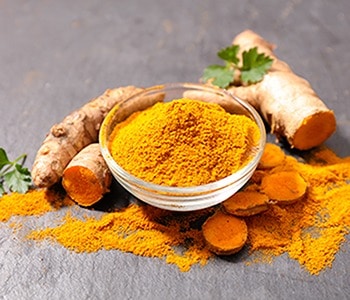 Turmeric, an integral part of the ancient medical system of Ayurveda, has been used to manage inflammation and its consequences for nearly 4,000 years [11].
Turmeric, an integral part of the ancient medical system of Ayurveda, has been used to manage inflammation and its consequences for nearly 4,000 years [11].
Modern science tells us that turmeric contains at least 100 chemical components. The main component is a volatile oil known as aromatic turmerone, or ar-turmerone, which is responsible for turmeric’s aroma [12].
Researchers are now investigating if and how ar-turmerone can help lower inflammation in brain cells, reverse memory loss, and limit brain damage by interacting with the immune system [13].
Turmeric also contains the active ingredient curcumin [14]. Thousands of scientific studies and over 100 clinical trials have shown that curcumin has remarkable antioxidant activity and neutralizes free radicals effectively. Curcumin also interacts directly with multiple targets in the body’s cells related to inflammation [15-21].
For instance, curcumin blocks production of a type of free radical known as reactive oxygen species (ROS), which plays an important role in inflammation [22].
In animal studies, curcumin has also been shown to reduce the levels of the inflammatory marker C-reactive protein (CRP) [23].
Research shows that there’s a connection between chronic inflammation and many chronic health conditions including cancer, diabetes, cardiovascular, neurological, inflammatory bowel disease, and pulmonary diseases.
According to a 2015 report published in the journal Molecules, “the antioxidant properties of curcumin can play a key role in the prevention and treatment of chronic inflammation diseases [24].”
In a study dating back to 1980 published in the Indian Journal of Medical Research, individuals suffering from joint-related problems who consumed curcumin supplements reported significant improvements in morning stiffness, walking time, and swelling [25].
Metabolic syndrome is a health condition in which inflammation plays a role and whose symptoms include high blood pressure, excess blood sugar, and poor weight management. If left unchecked, it can lead to potentially deadly health problems. In a double-blind, placebo-controlled study reported in the journal Nutrition in 2016, individuals with metabolic syndrome were given either curcumin or placebo for eight weeks [26].
Individuals who consumed curcumin showed improved blood levels of multiple inflammation markers, including CRP. They also had lower blood sugar levels. In conclusion, the study’s senior author stated that, “The findings of our studies, along with clinical findings reported by other groups, indicate the usefulness of daily use of curcumin supplement for the prevention and treatment of several diseases [27].”
Curcumin also helps to manage the effects of chronic inflammation on the skin. Radiation therapy causes many severe side effects, including radiation dermatitis caused by local inflammation. In a randomized, double-blind, placebo-controlled clinical study, patients were given either two grams of curcumin or control orally three times daily throughout their radiation therapy sessions [28]. Curcumin therapy was shown to significantly reduce the severity of radiation dermatitis.
Similarly, both turmeric and curcumin have been shown to help manage other skin conditions associated with inflammation.
#2: Foods Containing Omega-3 Fatty Acids
Omega-3 fatty acids are also known as essential fatty acids because they are essential for many important biological processes in the body. However, our body cannot make them, so we need to get them from our diet or from supplements. Alpha-linolenic acid (ALA), eicosapentanoic acid (EPA), and docosahexanoic acid (DHA) are the best-known omega-3 fatty acids [29,30].
Good sources of ALA include chia seeds, flax seeds, hemp seeds, walnuts, almonds, and hazelnuts. DHA and EPA are present in cold water fatty fish such as mackerel, sardines, salmon, herring, and trout, and in fish and krill oils.
In fact, DHA and EPA are originally made by microalgae – and when krill and fish consume these algae, they accumulate DHA and EPA in their bodies [31,32]. The only practical way for us to get the levels of EPA and DHA we need to maintain our health is to get them directly from foods and supplements.
Omega-3 fatty acids are important structural components of the so-called “cell membranes” that surround and protect each cell in our body. Omega-3 fatty acids are also used to make signaling molecules known as eicosanoids, which carry out many functions in our heart, blood vessels, lungs, and immune and hormonal systems [33,34]. Eicosanoids are also key mediators and regulators of inflammation.
Arachidonic acid is our body’s main source of pro-inflammatory eicosanoids. EPA and DHA compete with arachidonic acid in making eicosanoids. Higher levels of EPA and DHA have been shown to tip the balance in our body toward lower inflammatory activity [35].
For instance, animal studies show that production of arachidonic acid‐derived eicosanoids can be reduced by EPA or DHA consumption [36]. Similarly, numerous studies with both healthy human volunteers and patients with inflammation-related health conditions show that consuming fish supplements containing EPA and DHA can lower production of arachidonic acid‐derived eicosanoids in their body [37].
EPA and DHA also help to manage inflammation by lowering production of the small immune signaling proteins known as cytokines, reducing the activity of immune T cells, and blocking production of the pro-inflammatory transcription factor NF-kappa B [38].
#3: Medicinal Mushrooms
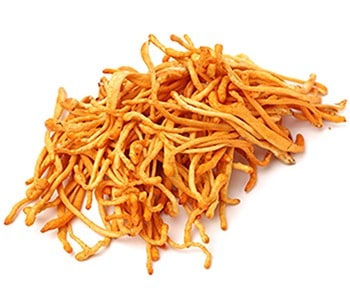 Did you know that more than 100 mushroom species are currently being studied all over the world to uncover their health benefits? Modern scientific research is now confirming what many ancient cultures have long known – that mushrooms contain some of the most potent, yet safest chemical ingredients found in nature [39].
Did you know that more than 100 mushroom species are currently being studied all over the world to uncover their health benefits? Modern scientific research is now confirming what many ancient cultures have long known – that mushrooms contain some of the most potent, yet safest chemical ingredients found in nature [39].
One such medicinal mushroom is Chaga, which has long been part of traditional folk therapy in Russia and other northern European countries. This mushroom contains many potent compounds and is known to have antioxidant properties [40-42].
For instance, a 2016 study showed that a Chaga polysaccharide could neutralize free radicals [43]. Another 2012 study showed that a water-based extract of Chaga could reduce the expression of pro-inflammatory cytokines [44].
Reishi is another well-known medicinal mushroom. Used for over 2,000 years by sages and shamans for traditional medicinal purposes, Reishi is well known for being able to both relax and fortify mind and body [45,46].
Natural chemicals present in Reishi have been shown to have antioxidant and immune-strengthening properties [47, 48]. For instance, a Reishi extract has been shown to neutralize free radical activity and support healthy liver function [49]. Health experts also believe that Reishi can help to counter some of the symptoms of aging, thanks to its anti-inflammatory properties, ability to fight free radicals, and reduce cellular damage associated with oxidative stress [50-52].
Cordyceps, also known as the caterpillar fungus, has long been a part of traditional Chinese and Tibetan medicine [53-55]. The authors of a 2012 study stated that Cordyceps polysaccharides “can also improve the antioxidation activity in immunosuppressed mice, significantly increase the superoxidase dismutase, catalase, and glutathione peroxidase levels and the total antioxidant capacity, and decrease the malondialdehyde levels in vivo [56].”
In fact, superoxidase dismutase, catalase, and glutathione peroxidase are innate enzymatic antioxidant systems in our body, while malondialdehyde is used as a marker for free radical damage. In other words, cordyceps directly helps to neutralize free radicals and also helps boost our body’s natural antioxidant systems.
#4: Green Tea
Tea is the most popular beverage consumed worldwide after water. Popular in Japan and parts of China, green tea accounts for about 20% of total tea production and has been thoroughly studied for its health benefits. Green tea contains caffeine, tea polyphenols, chlorophyll, and other compounds that contribute to its aroma and taste.
Green tea polyphenols include the catechins, of which epigallocatechin-3-gallate (EGCG) and epigallocatechin (ECG) possess antioxidant activity and have been shown to have anti-inflammatory effects in multiple laboratory, animal, and human studies [57-61].
Specifically, green tea and ECG have been shown to suppress the expression of pro-inflammatory cytokines and inflammation-related enzymes, along with blocking the activity of the pro-inflammatory transcription factor NF kappa B.
In other words, green tea extracts and tea polyphenols may prove to be useful in alleviating health conditions in which chronic inflammation plays a role [62,63].
#5: Wild Blueberries
Blueberries, native to North America, are closely related to cranberries, bilberries, and huckleberries. They contain polyphenolic compounds known as anthocyanins, which are water-soluble pigments that can appear red, purple, or blue, depending on their pH.
More than 600 anthocyanins have been identified in nature, where they mainly act as antioxidants to counter the actions of free radicals formed as a result of overexposure to UV light and extreme temperatures [64].
Laboratory studies as well as human clinical trials indicate that both blueberries and the anthocyanins they contain possess significant anti-inflammatory properties [65]. For instance, in a 2013 study published in the European Journal of Nutrition, consumption of a drink made from wild blueberries significantly reduced levels of oxidized DNA and increased resistance to oxidatively induced DNA damage in healthy male volunteers [66].
All the available evidence suggests that the anti-inflammatory actions of blueberries are linked to their antioxidant properties [67].
There you have it, 5 foods that are readily accessible in either whole food form or supplements that aid the body in minimizing the damaging effects of inflammation naturally: turmeric, omega-3s, medicinal mushrooms, green tea, and blueberries.
Replacing the processed, pro-inflammatory foods in your diet with these foods and beverages that are high in antioxidants is a positive step in reducing inflammation itself, as well as the debilitating diseases linked to chronic inflammation.
Turmeric 3D from Organixx provides you one of the most “bioavailable” forms of turmeric due to its unique fermentation process. This means your body experiences the maximum benefits of the purest, most potent turmeric available!
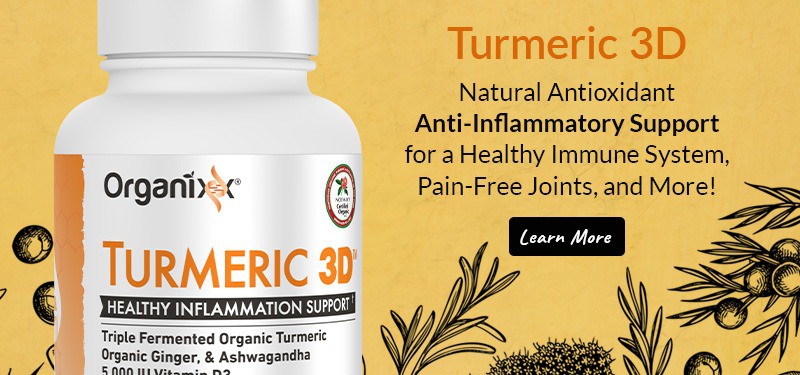
 Sources:
Sources:
Article Summary
Inflammation exists to protect our body, but chronic inflammation can cause serious health problems.
We need to consume antioxidants in our food and/or as supplements.
Curcumin has remarkable antioxidant activity and neutralizes free radicals.
To get the levels of EPA and DHA we need is to get them directly from foods and supplements.
Natural chemicals present in Reishi have been shown to have antioxidant and immune-strengthening properties.
Green tea extracts may prove to be useful in alleviating health conditions related to chronic inflammation.


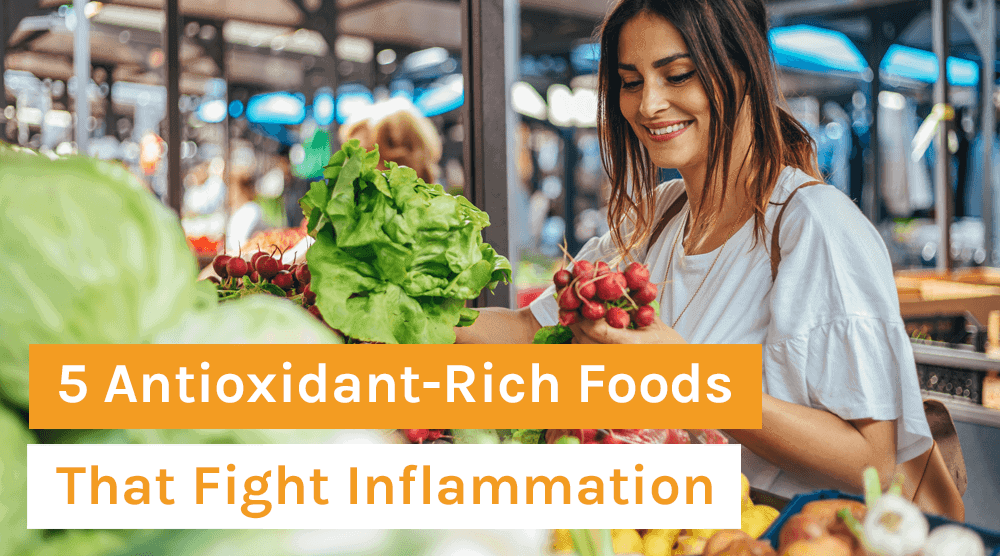
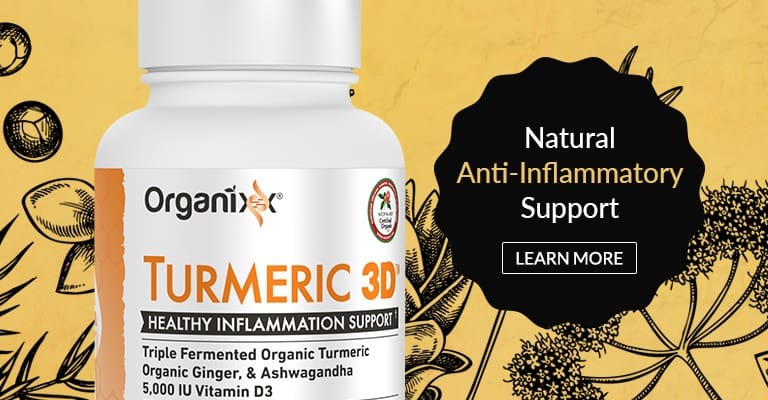


Wild blueberries were easy for me to find when I lived in rural Ontario. Unfortunately, I have little or no access to the places where I can find wild blueberries now.
65 and disappointed. Sadly, I have not noticed any pain relief, increased energy or any other benefits from taking your Turmeric 3D or your Multi -Vita-Max. They appear to have great ingredients but haven't worked for me. Arthritis and age are frustrating (as are the additional costs of receiving your products in Canada). I haven't tried your Collagen because I am a pescatarian.
Hi Sharon, we're sorry to hear that our Multi-Vita-Maxx and our Turmeric3D didn't work for you. We appreciate your feedback.
May we ask how long you took the product for? Please know, that individual results may vary. With natural products, sometimes people need 1-3 months to see/feel results.
With that said, we do have a very generous return policy that you may avail. We're confident that Organixx provides only high-quality supplements. However, if for any reason you're not satisfied with your purchase, you may return the product (empty, unused portion and opened) for a full refund less the shipping and handling fees. Please click here to learn more about the Organixx Return Policy: https://support.organixx.com/236763-Organixx-Return-Policy.
Please let us know if there is anything else we can help you with. We hope you have a wonderful day and we wish you the best in your wellness journey!
I am a 70 year old female believer in supplements for a healthy long life.
I have researched on google a number of alternative supplement companies and used them in the past.
Regards myself, Organixx stands out for its dedication and care in producing very high quality safe and healthy organic products. I have finally found a company I trust. Organixx pricing is also very competitive.
My shipment is on the way of Organixx Cleaned Sourced Collagen. I can’t wait.
My shipment of medicinal mushroom complex 7M+ arrived a few days ago. I also take their Turmeric 3D apart from other of their supplements. My joint pains are now non-exisrance. My energy is the best it’s been.
Do you have a high grade Vitamin C (only) supplement? Cheers, Paddy
Hi Paddy, thank you very much for your feedback! We are so happy to know that you are loving Organixx and we appreciate the trust and support you have for our products and our company. It is also great to hear that you have chosen us as your wellness partner and that you are experiencing good results from our supplements. Congratulations on being healthy and pain free!
Aside from the Clean Sourced Collagens, which uses Acerola Chery and Camu Camu as a Vitamin C source, we also have the newest Restore Vitamin C Serum. It is the most scientifically-advanced topical Vitamin C on earth, designed to keep your skin youthful,radiant, and healthy for the long term.
We would also like to invite you to the 12 Days of Christmas Sale! It is our biggest sale of the year and this is the best time to purchase your favorite supplements and essential oils since we have huge discounts and great deals. I hope you can check it out and avail this promotion: https://shop.organixx.com/pages/holiday-specials-2019.
Thank you for being a valued customer and we wish you the best!
I just bought the organicxx clean collagen and noticed right away on how well it reduce my pain. I just started back riding horseback after years of not riding and felt like I was ran over by a train and ached and hurt all over.
What a great product. I now take it daily and could not go without it. I am pain free.
Thank you so much for your wonderful feedback, Kelly!
We are so pleased to hear how the Organixx Clean Sourced Collagen has helped you in your health problems. We appreciate you sharing your personal experience with us and we are happy to know that you are now free from pain and that you can now go back to doing the activities that you love.
We wish you the best in your horseback riding and we hope to have you back as our repeat customer! :)
Just purchased the collagen...Is this also good for inflammation?
Hi Terri, we're glad to hear that you have purchased our Clean Sourced Collagen. You may take a look at these articles to learn more about how collagen can be a natural solution for joint pains caused by inflammation: https://organixx.com/collagen-for-joints/ and to read the list of how collagen benefits the skin and joints: https://organixx.com/benefits-of-collagen/.